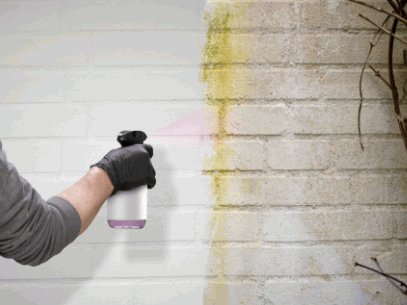Looking to spruce up your brick surfaces? Using vinegar as a cleaning solution might just be the answer!
We explore why vinegar is a great choice for cleaning bricks, what type of vinegar to use, and how to prepare the perfect vinegar solution.
Get a step-by-step guide on cleaning bricks effectively, along with the benefits of using vinegar and some additional tips to ensure your bricks are looking their best. Let’s get started!
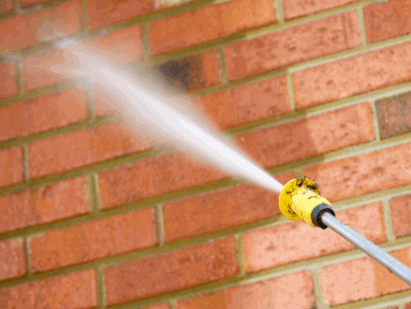
Why Use Vinegar To Clean Bricks?
Using vinegar to clean bricks is a popular and effective method recommended by masonry specialists like Gerber Ortiz-Vega.
One of the key advantages of using vinegar for brick cleaning is its exceptional effectiveness in removing tough stains and dirt from both interior and exterior surfaces. The acidic nature of vinegar helps break down grime and built-up residue without causing damage to the brick material.
Vinegar is a natural and eco-friendly cleaning solution, making it a safer alternative to harsh chemical-based cleaners. It is non-toxic, biodegradable, and poses no harm to the environment, unlike many conventional cleaning products.
Professionals like Gerber Ortiz-Vega often recommend vinegar as a versatile yet gentle cleaner for bricks due to its ability to tackle a variety of stains, including mold, mildew, and mineral deposits. Its affordability and availability also make it a practical choice for routine maintenance of brick surfaces.
Dig deeper: How To Deal With Hoarders
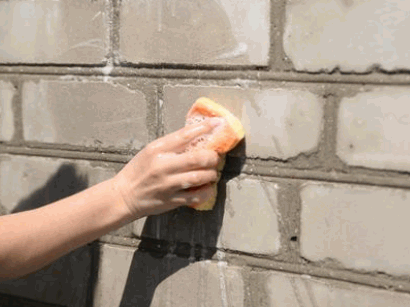
What Type Of Vinegar Should Be Used?
When cleaning bricks, it is essential to use the right type of vinegar, with white vinegar being a commonly recommended choice.
White vinegar is preferred for brick cleaning due to its high acidity levels. This acidity allows white vinegar to effectively break down grime, mold, and stains that can accumulate on various brick surfaces. The chemical properties of white vinegar make it a powerful yet safe cleaner for bricks, providing a natural alternative to harsh chemical cleaners. Its ability to penetrate and dissolve build-up makes it an ideal solution for restoring the original appearance of brickwork. When mixed with water, white vinegar forms a potent yet eco-friendly cleaning solution that can tackle tough brick stains with ease.
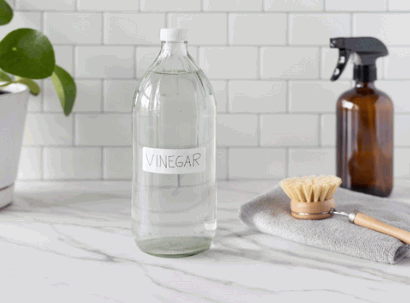
How To Prepare The Vinegar Solution?
Preparing a vinegar solution for cleaning bricks involves simple steps and minimal ingredients to create an effective cleaning agent.
Mixing the solution is a straightforward process that requires combining vinegar with water in a 1:1 ratio. Simply pour equal parts of both ingredients into a container or a spray bottle. Once the solution is ready, stir or shake it well to ensure proper integration of the vinegar with water.
Safety precautions are paramount when working with any cleaning agent. Remember to wear protective gloves and eye goggles to avoid any skin or eye irritation. It is also advisable to carry out a small test patch on a discrete area of the bricks before proceeding with the entire cleaning process to determine any adverse reactions.
What Materials Do You Need?
To clean bricks with vinegar, you will need basic materials like rubber gloves, brushes, and other cleaning supplies to ensure a thorough cleaning process.
Rubber gloves are essential for protecting your hands from the acidity of the vinegar and any chemicals in the cleaning products. They provide a barrier to prevent skin irritation or burns during the cleaning process.
The brushes, such as scrub brushes or wire brushes, are used to physically scrub away dirt, grime, and stains from the surface of the bricks. They help to agitate the cleaning solution and loosen the buildup for effective cleaning.
Other cleaning supplies like vinegar, water, and cleaning solution are needed to create the cleaning mixture. Vinegar acts as a natural acid that helps break down stains, while water dilutes the solution and makes it safe to use. The cleaning solution aids in dissolving tough deposits on the brick surface.
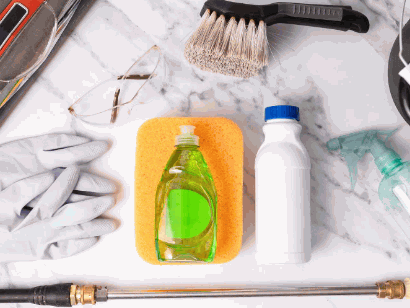
Step-By-Step Guide To Cleaning Bricks With Vinegar
Cleaning bricks with vinegar can be done effectively by following a comprehensive step-by-step guide that ensures a thorough cleaning process.
First, start by preparing the area around the bricks, and removing any furniture or objects that may obstruct the cleaning process. Ensure ample ventilation while working with vinegar to avoid inhaling strong fumes.
- Next, mix a solution of vinegar and water in a 1:1 ratio in a bucket. This combination serves as a potent yet natural cleaning agent that effectively breaks down dirt and grime.
- Using a scrub brush or sponge, apply the vinegar solution generously onto the bricks, focusing on areas with visible stains or discoloration. Allow the solution to sit for about 10-15 minutes to penetrate the tough spots.
- Then, gently scrub the bricks using back-and-forth motions to loosen the dirt. For tougher stains, create a paste by mixing vinegar with baking soda and applying it to the affected areas.
- After scrubbing, rinse the bricks thoroughly with water to remove the vinegar residue and leftover grime. Use a garden hose or a bucket of clean water for this step, ensuring all traces of vinegar are washed away.
For stubborn stains, consider repeating the process or using a more concentrated vinegar solution. For a pristine finish, consider sealing the bricks after cleaning to protect them from future dirt buildup.
Step 1: Prepare The Area
Before starting the cleaning process, it is crucial to prepare the area by removing any obstacles and protecting surrounding surfaces from potential damage.
To ensure a smooth and effective cleaning operation, start by clearing the area of any loose debris or objects that might hinder the process. This not only allows for better access to the surfaces to be cleaned but also reduces the risk of accidents or obstructions during work.
Ensuring safety is key, take the time to cover nearby plants, furniture, or other items that could be affected by the cleaning solution. By doing so, you prevent any accidental spills or splashes that could cause damage or discoloration.
Step 2: Mix The Vinegar Solution
The next step in cleaning bricks with vinegar is to mix the vinegar solution according to the recommended ratios for optimal cleaning results.
For an effective vinegar solution, it is typically advised to mix one part vinegar with five parts water in a large container. This vinegar-water mixture not only helps in cleaning the bricks effectively but also ensures that it is gentle on the surface. To further boost the cleaning power, you can add a small amount of dish soap to the solution.
Thorough mixing is crucial to ensure that all components blend well together, creating a uniform solution. Once mixed, you are ready to apply the vinegar solution onto the bricks using a brush or spray bottle for an even coating.
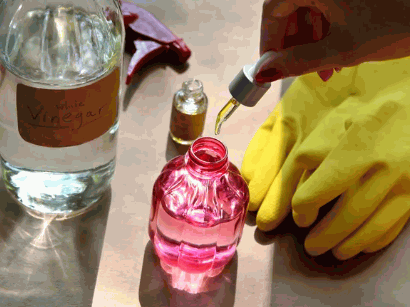
Step 3: Test The Solution On A Small Area
Before applying the vinegar solution to the entire brick surface, it is advisable to test it on a small, inconspicuous area to ensure compatibility and effectiveness.
This simple step can help prevent any unwanted outcomes and ensure that the vinegar works as intended.
By observing how the vinegar interacts with a small portion of the brick, one can determine its impact on stains and grime without risking damage.
It is crucial to watch for any adverse reactions such as discoloration or deterioration before proceeding with full-scale cleaning.
Step 4: Apply The Vinegar Solution
Once the vinegar solution is ready and tested, carefully apply it to the brick surface using the appropriate cleaning technique to cover all areas effectively.
Whether you choose to spray the solution, brush it on, or soak the bricks, it is crucial to ensure even distribution for optimal results. Start from the top and work your way down, making sure no spot is left untouched. For spraying, maintain a consistent distance to avoid oversaturation in certain spots. When brushing, use gentle yet thorough strokes, paying extra attention to crevices. If soaking, allow enough time for the solution to penetrate and work its magic. This meticulous approach guarantees thorough coverage for a deep clean.
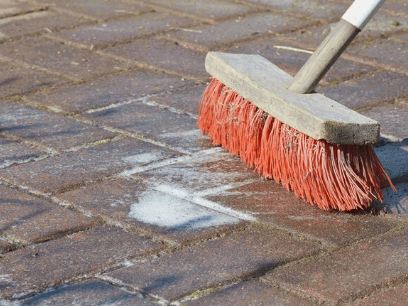
Step 5: Scrub The Bricks
To tackle stubborn stains and dirt buildup, use a hard bristle brush to scrub the bricks gently but effectively, focusing on areas that require extra attention.
When scrubbing the bricks, ensure the brush bristles are firm enough to dislodge the grime without being too abrasive.
- For grease stains, create a mixture of warm water and mild dish soap to gently scrub the affected area, and rinse with clean water afterward.
It is vital to test any cleaning solution on a small inconspicuous area first to prevent potential damage to the brick surface.
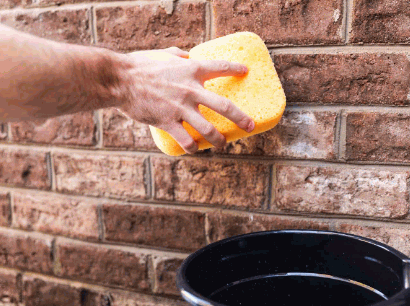
Step 6: Rinse The Bricks
After scrubbing the bricks with the vinegar solution, thoroughly rinse the surface with water to remove any residue and ensure a clean finish.
This final step is crucial in the brick cleaning process as it helps to eliminate any leftover cleaning solution and debris, leaving behind a pristine appearance. Rinsing with water not only enhances the overall look of the bricks but also ensures that no streaks or spots are left behind. Proper rinsing is key to achieving a polished and professional finish, making the effort put into cleaning the bricks truly worthwhile.
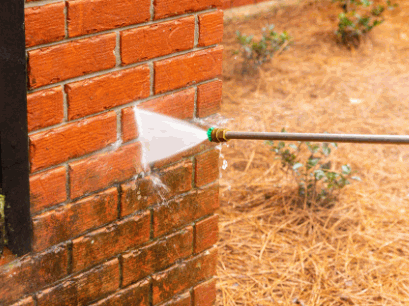
How Often Should You Clean Bricks With Vinegar?
The frequency of cleaning bricks with vinegar depends on factors such as the level of dirt accumulation, environmental conditions, and personal preference.
For bricks in high-traffic areas prone to rapid dirt buildup, using vinegar once a month might be necessary to maintain cleanliness. Conversely, bricks in less exposed locations may require cleaning with vinegar every few months. Understanding the impact of environmental elements like weather on brick surfaces can help determine the frequency of vinegar cleaning. Those who prefer a spotless appearance may choose to clean bricks more frequently, while others may opt for a more relaxed schedule.
What Are The Benefits Of Using Vinegar To Clean Bricks?
Utilizing vinegar for brick cleaning offers numerous benefits, including its effectiveness in removing stains and grime from different types of bricks.
One of the standout advantages of using vinegar as a cleaning agent for bricks is its incredible versatility. Vinegar can be used on various types of brick surfaces, whether indoors or outdoors, without causing any damage. Vinegar is an eco-friendly option, making it a sustainable choice for those conscious of its environmental impact. Its acidic nature allows vinegar to effectively tackle different types of stains, such as mold, mildew, and mineral deposits, leaving the bricks looking clean and revitalized. What makes vinegar even more appealing is its cost-effectiveness, as it offers an efficient cleaning solution without the need for expensive commercial cleaners.
Non-toxic And Environmentally Friendly
One of the key benefits of using vinegar to clean bricks is its non-toxic and environmentally friendly nature, making it a safer alternative to harsh chemical cleaning products.
Affordable And Easily Accessible
Another benefit of using vinegar for brick cleaning is its affordability and widespread availability, making it a cost-effective and convenient cleaning solution.
Vinegar offers economic advantages beyond just brick cleaning. Its low cost makes it an ideal choice for budget-conscious individuals looking to maintain a clean home without breaking the bank. With vinegar being readily available in most households and grocery stores, it eliminates the need to invest in specialized cleaning products, cutting down on extra expenses.
Effective At Removing Stains And Grime
Vinegar’s effectiveness in removing tough stains and grime from bricks is a significant benefit, showcasing its powerful cleaning capabilities.
One of the remarkable qualities of vinegar is its acidic nature, which enables it to penetrate deep into the porous surface of bricks. This makes it highly effective in dissolving and loosening up stubborn dirt, mold, and mildew that may have accumulated over time.
Vinegar’s versatility extends to a range of challenging stains, including rust marks, mineral deposits, and even efflorescence. Efflorescence, characterized by a white powdery residue on bricks, can be particularly tricky to remove, but vinegar’s acidic properties make it a top-choice solution for this type of stain.
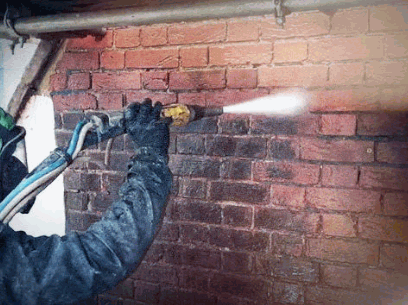
Can Be Used On Different Types Of Bricks
One of the advantages of vinegar as a brick cleaning agent is its compatibility with various brick types, ensuring consistent cleaning results without causing damage.
When dealing with red bricks, which are often used for their classic appearance in many buildings, using vinegar can effectively remove dirt and grime without altering the color or texture of the bricks. Limestone, a porous and delicate type of brick, requires gentle cleaning methods to prevent damage, making vinegar an ideal choice due to its mild acidity.
For engineering bricks, known for their durability and strength, vinegar provides a safe yet potent solution to remove stubborn stains while preserving the integrity of the bricks. Remember, wearing rubber gloves during the cleaning process is essential to protect your hands from the acidity of vinegar and any potential skin irritations.
Are There Any Risks Or Side Effects?
While using vinegar as a cleaning solution for bricks is generally safe, there are some risks and potential side effects to consider, especially if not used correctly.
One of the main risks associated with using vinegar for brick cleaning is skin irritation, which can occur due to prolonged exposure to the acidic solution. It is essential to wear protective gloves and clothing when handling vinegar to minimize the risk of skin irritation.
Using vinegar on certain types of bricks, such as limestone or sandstone, can lead to damage as the acidity may react negatively with these surfaces. It’s important to test a small area first or consult a professional before applying vinegar to delicate brick surfaces.
To mitigate these risks, always dilute vinegar with water before use and avoid mixing it with other cleaning products, as this can create harmful fumes. Proper ventilation is also crucial while working with vinegar to prevent respiratory issues.
By following these safety precautions and best practices, you can effectively clean bricks with vinegar while minimizing any potential side effects.
Additional Tips For Cleaning Bricks With Vinegar
Plus the standard cleaning process, there are several additional tips to enhance the effectiveness and safety of using vinegar to clean bricks.
One crucial tip is to always dilute vinegar with water before using it on bricks, as this can help prevent any potential damage to the surface.
Another recommendation is to test a small inconspicuous area of the brick first to ensure that the vinegar solution does not cause any discoloration.
When selecting cleaning supplies, opt for a soft-bristled brush or a sponge to gently scrub the bricks without causing scratches.
Consider wearing protective gloves and goggles to safeguard your skin and eyes from any splashes.
For tougher stains or grime, you may need to let the vinegar solution sit on the bricks for a few minutes before scrubbing.
Rinse the bricks thoroughly with water after cleaning to remove any residue and reveal a refreshed appearance.
